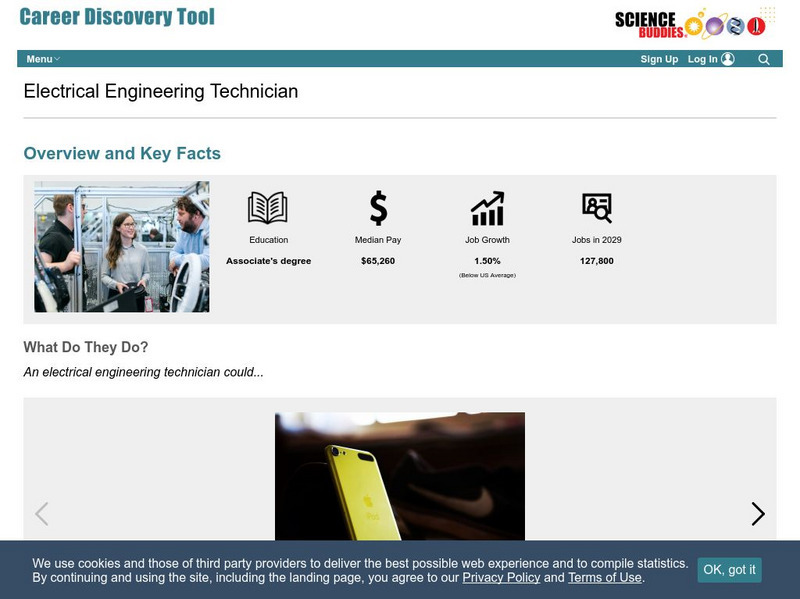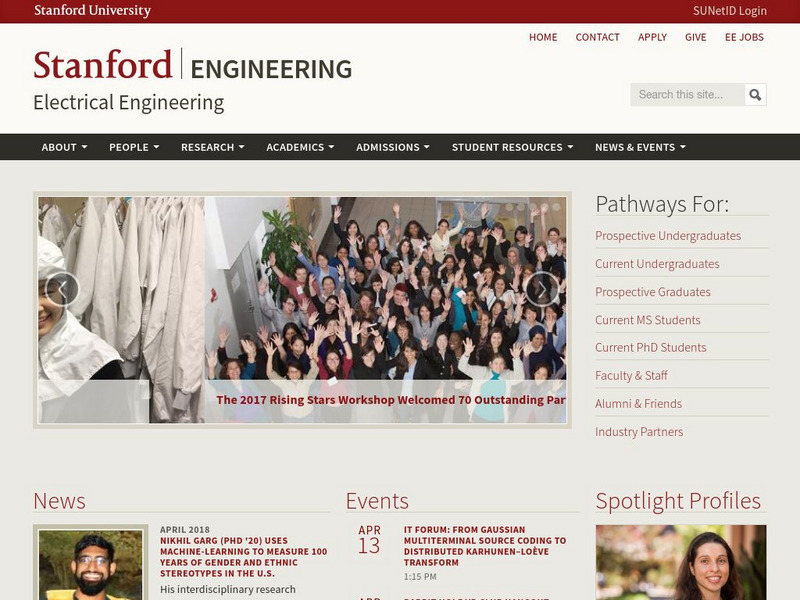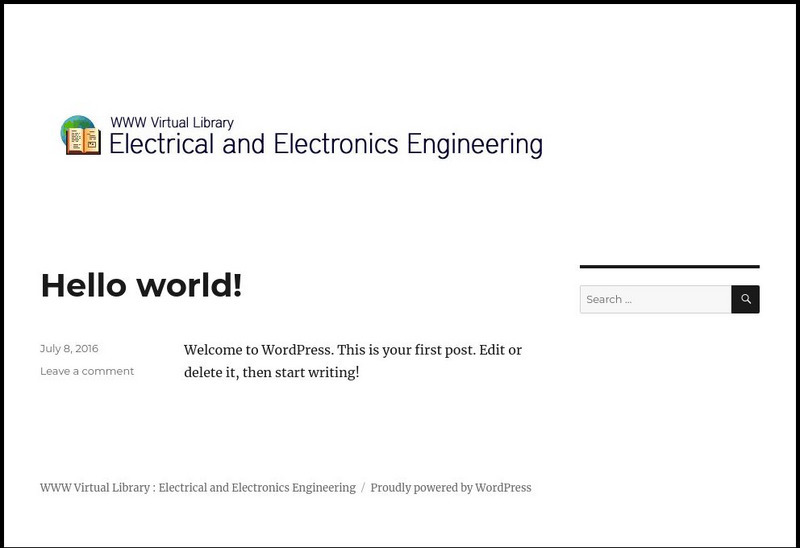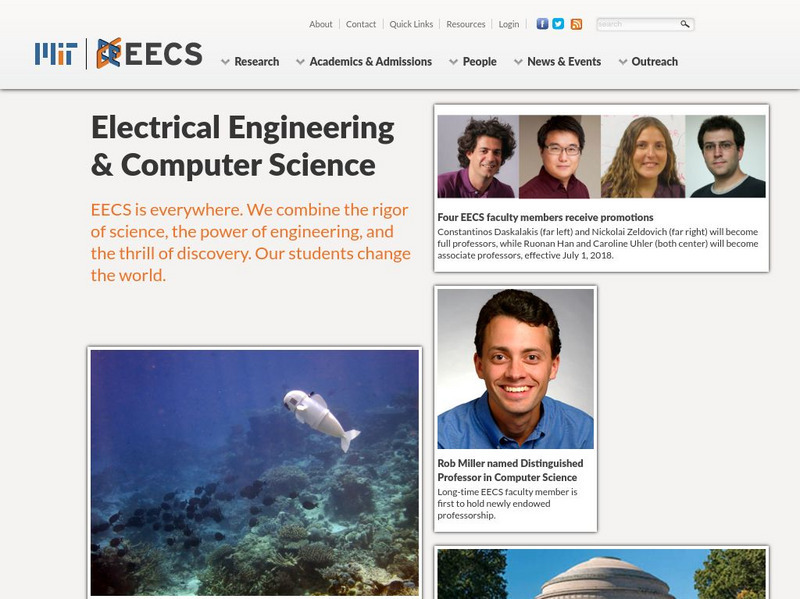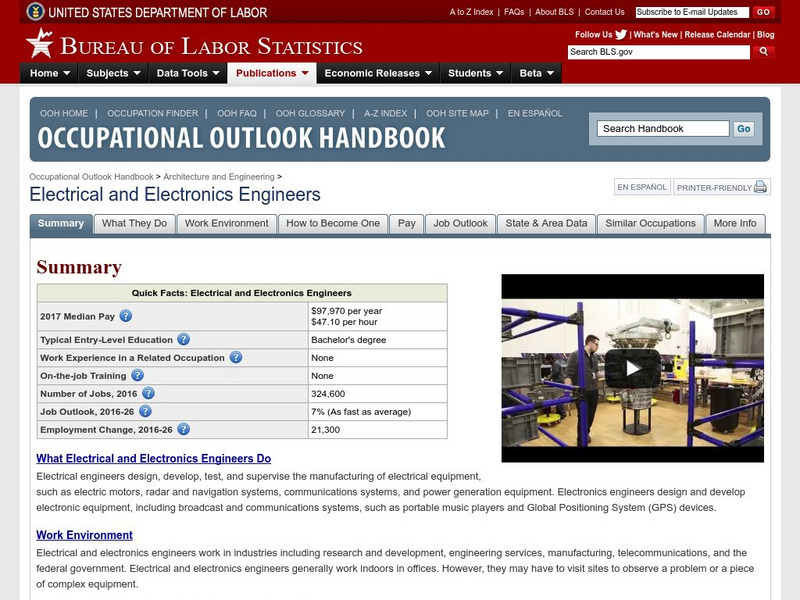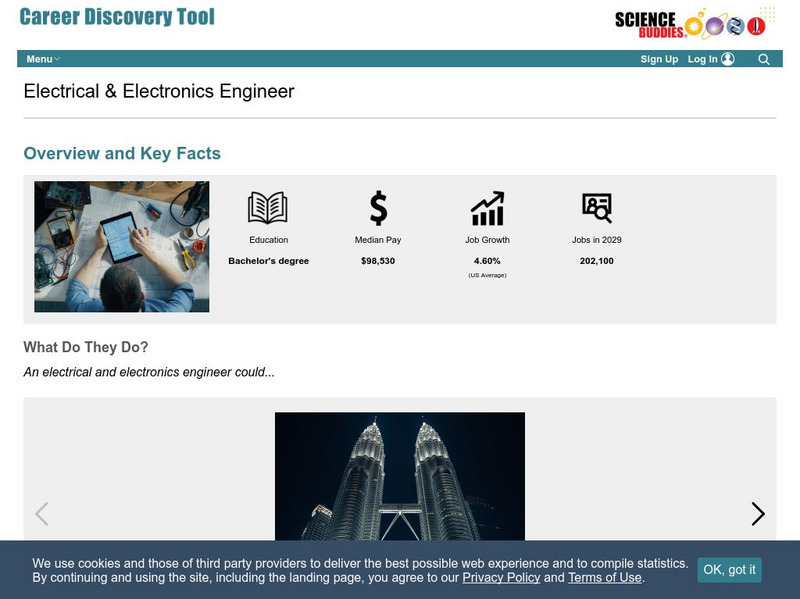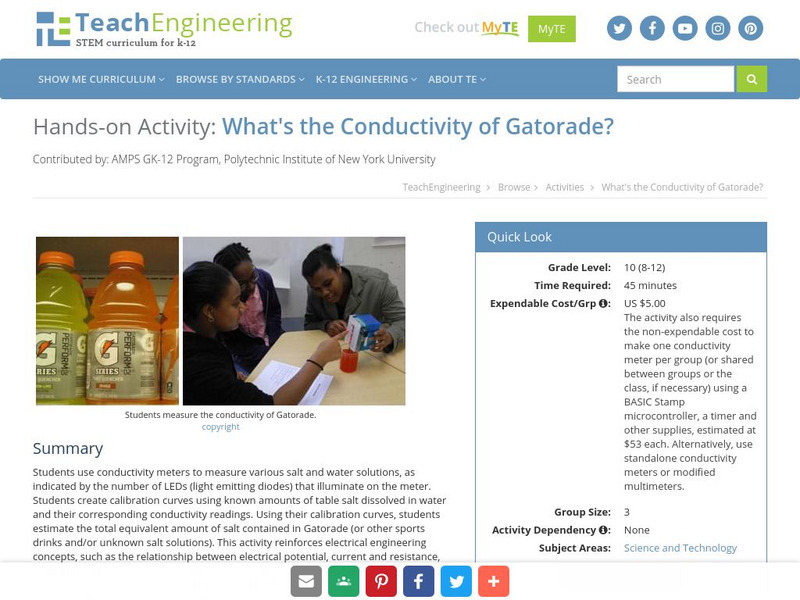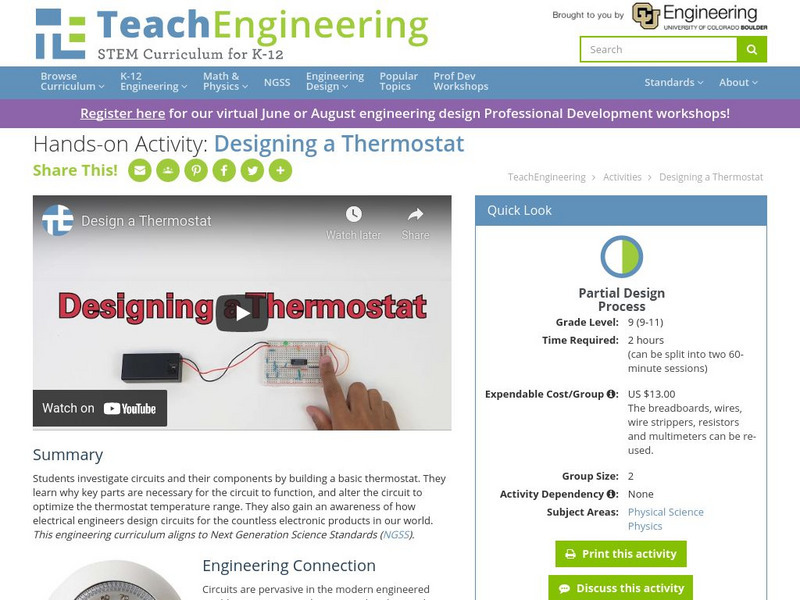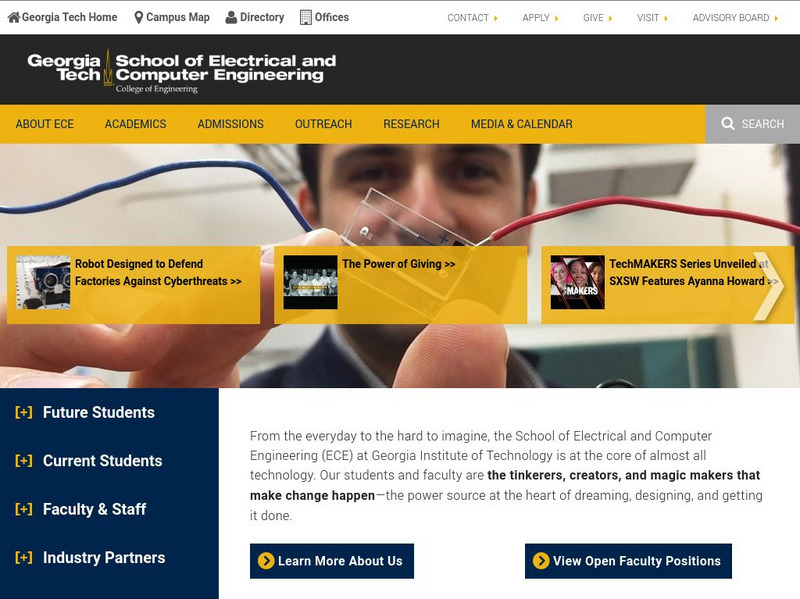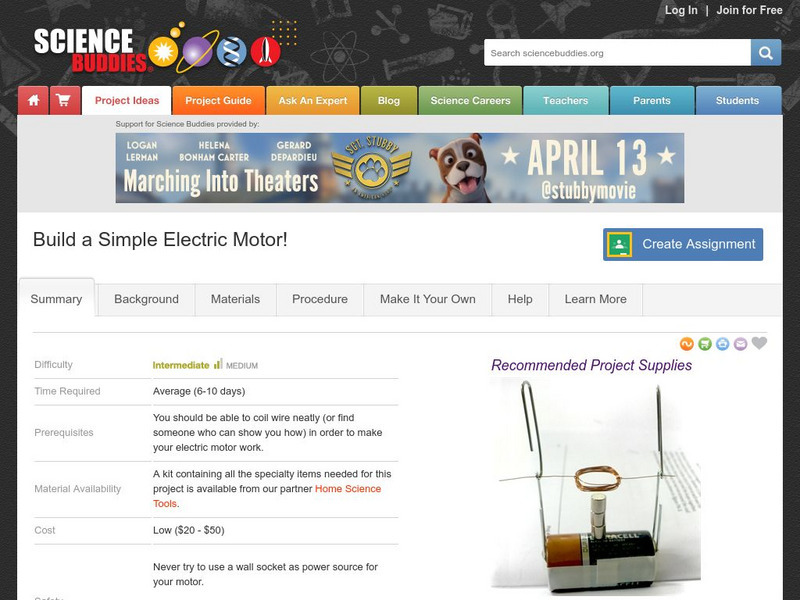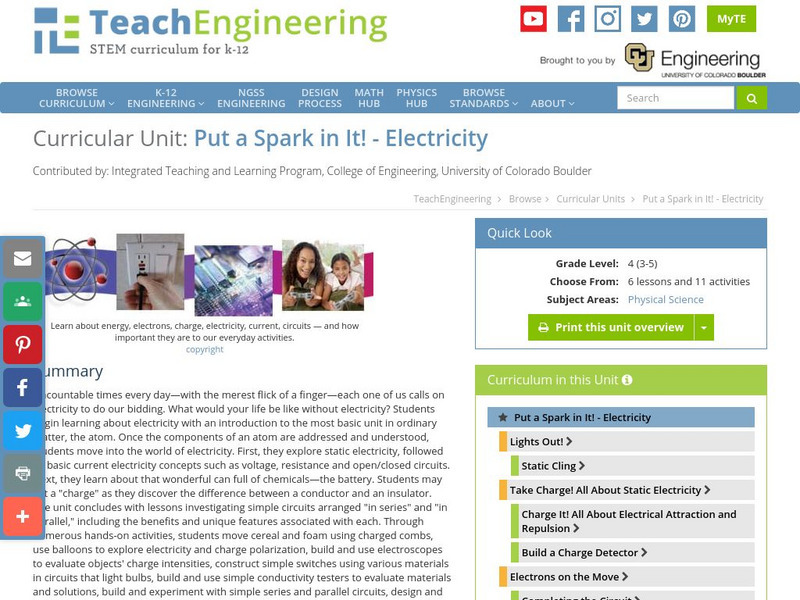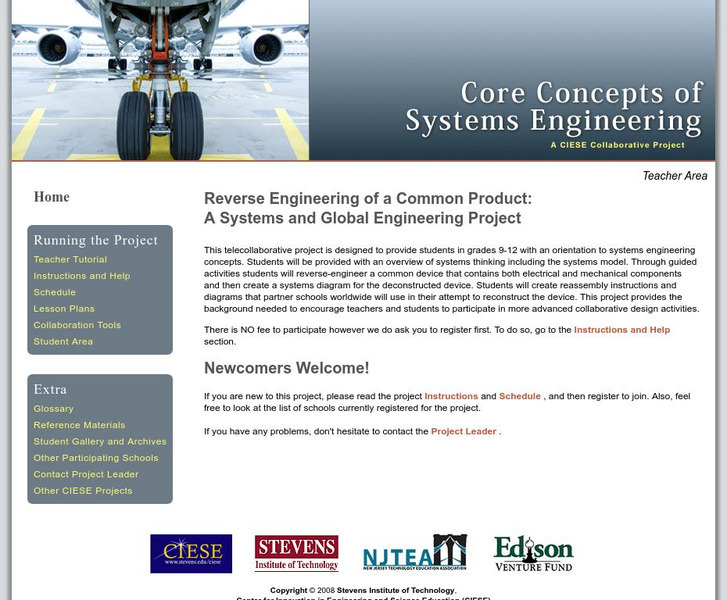Science Buddies
Science Buddies: Career Profile: Electrical Engineering Technician
Find out how the electric engineering technician assists in the research and development of electrical equipment, among other things. This Science Buddies site lays out the requirements needed to become a electrical engineering...
Career Cornerstone Center
Sloan Career Cornerstone Center: Electrical Engineering
A career in Electrical Engineering is profiled.Included: Electrical Engineering overview, Preparation, Day In The Life, Earnings, Employment, Career Path Forecast, Professional Organizations.
Stanford University
Stanford University Department of Electrical Engineering
This is the homepage of the Stanford University of Department of Electrical Engineering. There are links to information on research, academics, seminars, faculty, etc.
Stanford University
Stanford University Department of Electrical Engineering
This is the homepage of the Stanford University of Department of Electrical Engineering. There are links to information on research, academics, seminars, faculty, etc.
Other
The Electrical Engineering Virtual Library
This site has links to various topics about electrical engineering. These include institutions, resources, journals, etc.
Massachusetts Institute of Technology
Mit: Department of Electrical Engineering and Computer Science
This is the website for the Massachusetts Institute of Technology's Department of Electrical Engineering. The site has links to research, academics, etc.
Massachusetts Institute of Technology
Mit: Open Course Ware: Courses: Electrical Engineering: Circuits and Electronics
College-level electrical engineering course highlighting circuits and electronics. This course introduces the fundamentals of the lumped circuit abstraction. Course features include video lectures, suggested readings, labs, lecture...
US Department of Labor
Bureau of Labor Statistics: Electrical Engineers
This resource provides information about electrical engineer careers.
Khan Academy
Khan Academy: Electrical Engineering: Introduction
Some basic concepts to introduce the electrical engineering course. Become familiar with engineering numbers and notation, and learn about the two most important electrical quantities: current and voltage.
Cosmo Learning
Cosmo Learning: Applied Science and Technology 210: Electrical Engineering
A collection of video lectures from a course that explores the application of electrical engineering topics. Webpage includes twenty-eight lectures from a professor at the University of California, Berkeley. Lectures vary in length and...
Science Buddies
Science Buddies: Career Profile: Electrical and Electronics Engineer
Find out about the many pathways available to one who has a career as an electrical or electronics engineer. Design video games, cell phones, GPS systems, anything that requires electricity to work. This Science Buddies site lays out the...
TeachEngineering
Teach Engineering: What's the Conductivity of Gatorade?
Students use conductivity meters to measure various salt and water solutions, as indicated by the number of LEDs (light emitting diodes) that illuminate on the meter. Students create calibration curves using known amounts of table salt...
TeachEngineering
Teach Engineering: Designing a Thermostat
Students investigate circuits and their components by building a basic thermostat. They learn why key parts are necessary for the circuit to function, and alter the circuit to optimize the thermostat temperature range. They also gain an...
Other
Beginner's Guide to Measurement in Electronic and Electrical Engineering [Pdf]
The National Physical Laboratory, which is the UK's National Measurement Institute, offers a Beginner's Guide to Measurements in Electronics and Electrical Engineering. Discusses how electric currents are measured and offers images.
Other
Georgia Tech School of Electrical and Computer Engineering
Homepage of the Georgia Tech School of Electrical and Computer Engineering. This site contains information about ongoing research, academics, facilities, faculty, etc. at the university.
TeachEngineering
Teach Engineering: Electrifying the World
This lesson introduces students to the fundamental concepts of electricity. This is accomplished by addressing questions such as "How is electricity generated," and "How is it used in every-day life?" The lesson also includes...
Khan Academy
Khan Academy: Electrical Engineering: Electrostatics
Electrostatics is the study of forces between charges, as described by Coulomb's Law. We develop the concept of an electric field surrounding charges. We work through examples of the electric field near a line, and near a plane, and...
Science Buddies
Science Buddies: Spin Right 'Round With This Simple Electric Motor
If you put on clothes that were washed in a washing machine, rode in a car, ate food from a fridge, warmed up lunch in a microwave, or played a video game, you used an electric motor. Try this science fair project and you'll learn how to...
Khan Academy
Khan Academy: Electrical Engineering: Circuit Analysis
Circuit analysis is the process of finding all the currents and voltages in a network of connected components. We look at the basic elements used to build circuits, and find out what happens when elements are connected together into a...
TeachEngineering
Teach Engineering: Put a Spark in It! Electricity
Uncountable times every day "with the merest flick of a finger"each one of us calls on electricity to do our bidding. What would your life be like without electricity? Students begin learning about electricity with an introduction to the...
TeachEngineering
Teach Engineering: Potato Power
Students use potatoes to light an LED clock (or light bulb) as they learn how a battery works in a simple circuit and how chemical energy changes to electrical energy. As they learn more about electrical energy, they better understand...
TeachEngineering
Teach Engineering: Simple Coulter Counter
Students build and use a very basic Coulter electric sensing zone particle counter to count an unknown number of particles in a sample of "paint" to determine if enough particles per ml of paint exist to meet a quality standard. In a lab...
TeachEngineering
Teach Engineering: Particle Sensing: The Coulter Counter
Students are presented with a short lesson on the Coulter principle, an electronic method to detect microscopic particles and determine their concentration in fluid. Depending on the focus of study, students can investigate the...
Center for Innovation in Engineering and Science Education, Stevens Institute of Technology
Ciese: Reverse Engineering of a Common Product
A telecollaborative project where students communicate engineering concepts across the globe. Student tasks are to deconstruct a common device, then design reassembly instructions for others worldwide to follow to attempt to reconstruct...
